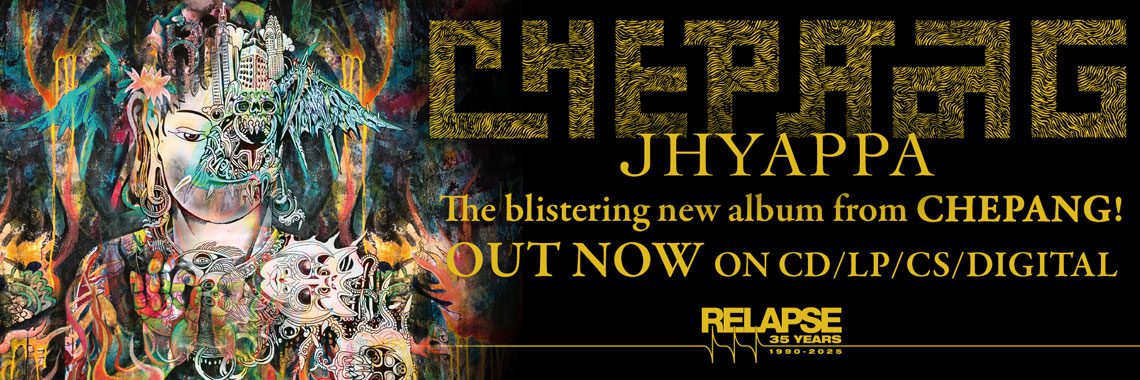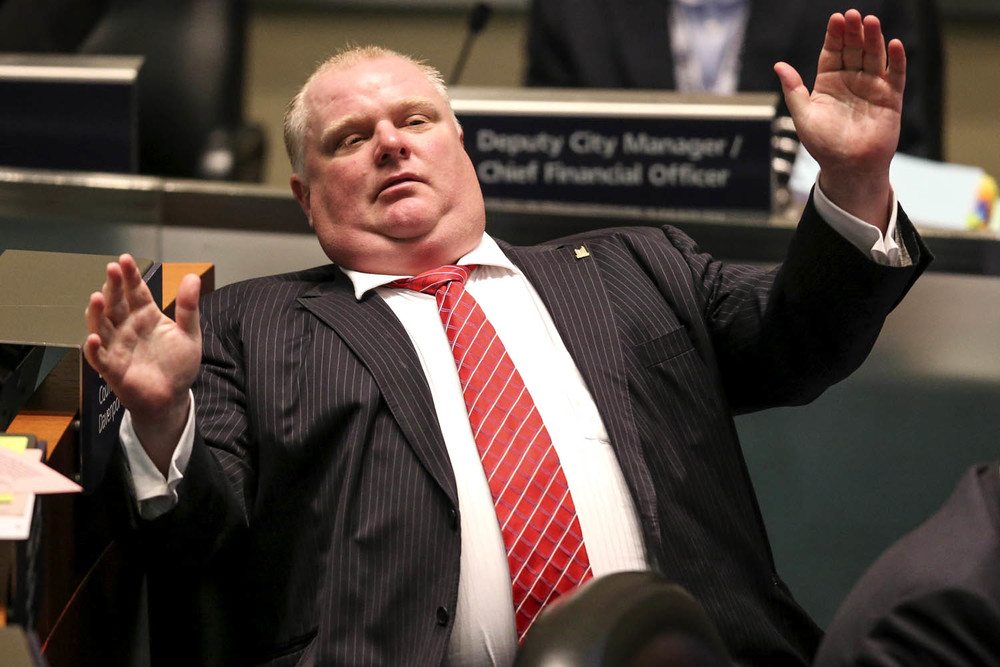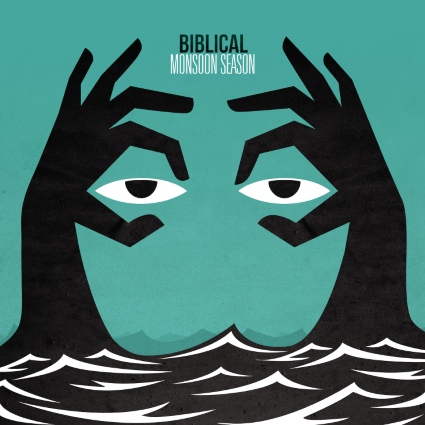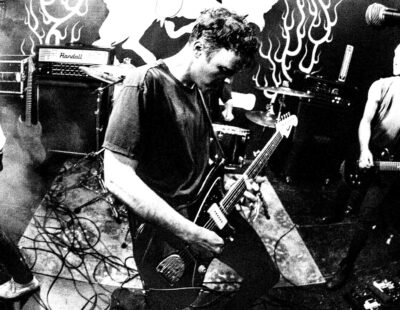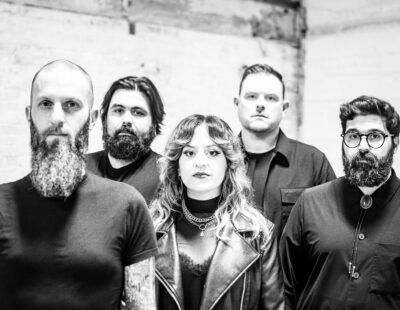I’ve known Nick Sewell, and been aware of his prodigious skill on the bass gee-tar, since the mid-90s. Good Lord! That’s round-and-about 20 real-life years, which is the equivalent of about 2000 musician/band years. In that time, dude has played in some of Toronto’s most notorious metal and hard rockin’ bands, including Tchort, The Illuminati and Drunkula and was one of few to have been signed to the ill-designed-and-fated Century Media imprint, Liquor and Poker Records. He’s also previously dealt with other illustrious labels like Dwell and Black Mark, so my man knows what it’s like to suffer at the hands of music industry incompetence. Sewell’s latest outfit is called Biblical, a quartet embracing a wealth of hard rock history and ramming it right down the sculpted, textured and collective throat of R&B, soul and metal. Their debut full-length, Monsoon Season has just hit the streets and let’s hope the folks at their present label, New Damage Records, can get this to as many ears as possible. I caught up with Nick via email to discuss all things Biblical and, of course, Rob Ford.
Can you give us a bit of band history?
The band started as a casual ‘hang out and play’ situation. I, along with guitar/organ player, Andrew Scott had been touring extensively with Sebastien Grainger’s band, The Mountains for a couple of years and over the summer of 2009 we had finished up our release cycle commitments. Suddenly, for the first time in about 15 years, I found myself without a band. Jay [Anderson, drums], Matt [Mclaren, lead guitar] and I knew each other from about town, but had never played together. They approached me and asked if I would be into just coming down to the space to drink beer and mess around. We hung out and played in the jam space for about six months with no name. Eventually, we started cobbling together riffs and working on formal arrangements, but we still didn’t have a name. Around that time, AMC was airing re-runs of Ghostbusters, like every other day. The name of band comes from the scene where they’re trying to convince the mayor of New York to let them fight Zuul and Bill Murray says, “This city is headed for a disaster of BIBLICAL PROPORTIONS”! I brought the idea in to practice one night and everyone was down, although we had the good sense to drop ‘proportions.’ In May of 2010, we played our first show opening for Danko Jones in Toronto at the Mod Club. Since then, we’ve done some light touring in Western Canada and some festival appearances. We also recorded a 10” EP in 2011.
Any bible-thumpers managed to find you and give you a hard time about your moniker yet?
No one’s given us a hard time yet, but there is a white reggae dude in California that we’ve been mistaken for. When we played the Sled Island Festival in 2011 they were using his photo for our festival bio [and he’s a] big, smiley white dude with dreads.
While I’m not familiar with the other dudes, I’ve known you for a long time and know you’ve been in a shit-ton of bands over the years. What does Biblical offer you personally that previous bands haven’t and how do you feel the band differs from the multitudes of 70s-influenced heavy rock coming out of everywhere these days?
Certainly what I like best about Biblical is the focus on atmosphere. Everything we do as a band about is about cultivating tension and then offering release. Most of our material is decidedly minor in key, so it takes on a darker palette. We don’t really pay attention to what other contemporary bands are doing. I think a big problem with modern music is that people hear a band and then start a band that sounds just like it. We don’t consider ourselves anything other than a rock band. People attach a lot of qualifiers like ‘stoner’ or ‘throw-back’ or ‘proto-metal.’ While there are moments when those genres might apply, the only one that always agrees with our sound is rock, and that’s the way we like it. It allows us the freedom to incorporate ideas from a vast multitude of musical styles and periods.
There seems to be some influence drawn from older rock and roll and R&B on Monsoon Season. Yes? No? Maybe so? How would you say your listening and playing habits have changed over the past handful of years?
We absolutely look to older rock and roll and R&B for both writing and production. Motown and Soul are incredibly instructive for building effective rhythm arrangements for the drums and bass. Fast or slow, loud or heavy, everything we play has to swing. We’re also big fans of early 60s soundtracks and über-producers like David Axelrod. There’s some amazing stuff from that period where you have a weird mix of jazz and orchestral, but then super gnarly guitar tones and harsh, compressed drums in a giant plate reverb tank. Those are the types of things that inspire us and inform the direction of our sound. In terms of listening and playing habits, I would say these days I have a much better appreciation for fundamentals. I grew up a metal kid. And as such, it’s easy to get caught up in the razzle-dazzle of guitar heroics or crazy drumming. But now I find I’m much more aware of the fine line of overplaying. Some of the most effective musical techniques are just the proper deployment of the fundamentals of rhythm and melody. So for Biblical, we try to draw maximum contrast between parts in our songs, whether it’s a big a key change or crushing riff after a mellow passage. What we’ve found is that those types of choices tend to connect with people when they hear it – even if they know nothing about music.
On that topic, what are your thoughts on the preponderance of 70s influenced heavy rock everywhere? What do you think this is a symptom/result of?
I’m not really sure. As I mentioned, I’m not super up on what’s going on in the genre. I kind of steer away from modern music that might have a bearing on the music I write. For contemporary stuff that’s loud and guitar based, I usually gravitate towards garage rock.
Your dad is former Toronto mayor, John Sewell, and is still involved in civic politics and affairs today. Have you and your pops had conversations about the antics of Rob Ford? What was that conversation like? What are your thoughts on the last year or so of His Portliness’ time in office?
My dad and I talk politics non-stop, both local and international. It’s interesting to get his perspective because he’s totally from a different era. My dad was a hippy councillor in the ‘70s who ended serving as mayor from ’78 to ’80. He’s written several books about urban planning, so he has some pretty strong ideas about how cities should be structured and cultivated. We’ve certainly laughed about Rob Ford because he’s such a ridiculous character, but we’ve also had had much longer conversations about his policies and how they affect our city. Without boring people with the ins-and-outs of Toronto politics, the short version is that guy’s policy decisions are completely inconsistent with the mandate he rode to power on and of questionable utility to building a thriving city.
What’s the title of the album in reference to and how does the cover art apply to theme?
The title Monsoon Season was taken from the song of the same name that appears on the record. It’s an epic jam that we really felt captured all the themes we were trying to explore. We also liked that it had a biblical connotation of the great flood or some other act of God-type weather event. Lyrically, it took on the theme of a weathering storm. The last five years have been a bizarre and difficult time for me personally. There has been a lot of illness in my family resulting in a number of deaths. So, Monsoon Season is a bit of short-hand for those dark times. The cover art was a mix of themes. We used the motifs of staring eyes and hands on our 10”. So, including those in a new design seemed to be a natural fit. I had always had a picture in my head of two giant tidal waves rising up, sort of capturing the band’s loud/soft dynamic. One morning at work I was totally procrastinating and I just spat out the cover design; I guess it was just one of those things. It’s actually rather in vogue these days, but the design sensibility is a clear tribute to the great title designer Saul Bass. As I mentioned earlier, I’m a really big fan of early 60s music, specifically soundtracks. I wanted it to look like an Otto Preminger thriller or something, so I was actively thinking of a graphic style that captured those themes and that era. The palette is a nod to some of the old Blue Note Records cover designs of the same era.
As I understand it, much of Monsoon Season found its form during live shows and on tour. How would you say the songs morphed over the course of those live runs? How different are they from what they were like when they were first written? How long did it take to get these songs together and written?
About half of Monsoon Season was hammered out through playing live. The other half was actually written in a rather experimental fashion as we tracked, which was a nice contrast. It’s been amazing to now go back and develop the live arrangements for those songs. We have a habit of extending our material when we play it live and it’s been really cool to see how those songs adapt to the stage. A couple of the tunes have been in the set since about 2011. Around that time, I started working on home demos for some of the others. We started actually tracking at the beginning of the summer 2012. As I mentioned, some of these tunes were totally experimental. And in the case of one – I won’t say which! – it ended up being totally rewritten when we were tracking the guitars. Since we didn’t have a real budget, we worked on it bit-by-bit throughout 2012. By early last year, we had all the tracks locked and started mixing through the spring. By the summer of 2013, we had a mixed and draft mastered version that we used to shop around. We worked on the deal with New Damage over the late summer and had formalized our relationship by September.
Tell us about the recording process. Do you feel you captured as much live energy as you could considering much of the woodshopping was done in a live capacity?
Despite the prolonged schedule, I’m very happy with the way in which we worked. As I mentioned, only half of the material was hashed out on stage. While it’s amazing to battle test your songs in that manner, there’s something be said for ‘not doing that.’ Playing stuff live means you only work with the tools of that canvas. I’m not sure we would have stumbled on some of the awesome moments we did had we not adopted an experimental approach to some of the material. I have to be honest— the recording process was pretty ghetto and very piecemeal. Frankly, it’s amazing to me, because this is far and away the best sounding record I’ve ever made. The process began with Jay and I tracking beds for all the tunes. As I mentioned, I had done extensive home demoing of the songs that we didn’t already know so we had a good reference point for tempos, etc. Following those sessions, I took all the drum tracks home and re-did my bass parts. We added the guitars in stages. Andy works at guitar store called Paul’s Boutique. They have a jam space in the basement, so we would track there after the store closed. It was pretty great because we had an amazing array of gear at our disposal. We would gang multiple amps and mics together to get crazy tones. We’d pull a Les Paul for this part or Jazzmaster for that part and just basically do what we thought would sound craziest. I had a great mobile set-up running on [my] laptop that allowed us to capture everything at 24-bit/96k, so we were certainly grabbing everything at maximum fidelity. When it came time for Matt’s parts, we did everything in our practice space (which is hilariously located in a garage behind a house in which no band member actually lives anymore. Somehow, they still let us rent the garage). I have to salute Matt because by the time we got to tracking his parts, it was already December and our modest space doesn’t have much in the way of heating. The vocals were tracked at my home with the kind use of some fantastic Neve gear courtesy of Matt DeMatteo, who mixed the album. After tracking everything, I did a little premix on everything for reference and then passed the stems on to Matt. He worked his magic and took everything into the stratosphere.
How would you characterise Monsoon Season against the self-titled 10” record?
We really just tried to expand on the ideas that we introduced on the 10”. At this point, we have a much better idea of what our band is about and what people want from us. On the 10”, the final song “Oubliette” was and remains a fan favourite. We realized that it summarized everything we were trying to do – it’s that mix of loud/soft/harsh/mellow. So we wondered what would happen if we made a whole record built around those ideas. It’s not to say that Monsoon Season all sounds the same, because the songs have their own character. But I think you can find that all the songs abide by those principles in their way.
Touring Canada can be a pain in the ass. Tell us about your most entertaining pain in the ass experience while touring across Canada?
To be honest, we’ve only done a modest amount of touring up to this point, but we do have a couple of stories. Last year we had the fortune of returning to Sled Island in Calgary – just in time for the flood. We’re Biblical. We bring inclement weather wherever we go. We got in Thursday and played a fantastic show with Torche. We had heard about the flooding, but didn’t think much of it. The next morning we awoke in our hotel—which was a grand, historic old hotel in the heart of the city – with all the power off and the festival cancelled. We walked outside and literally at the end of the block, the water was four feet deep! Needless to say, the whole city was in chaos. The festival was cancelled. We weren’t supposed to fly out until Sunday and here it was Friday morning. It was totally surreal. Walking downtown was a like a zombie movie. Tall buildings, all pitch black and no one on the streets!
What’s next once the record is out and about?
Tour. Just play as much as we can. The record is coming out in Canada, the US, the UK, the EU and Australia. That’s a lot of places we want to visit! That said, we’ve already got a bunch of ideas for the next one!

